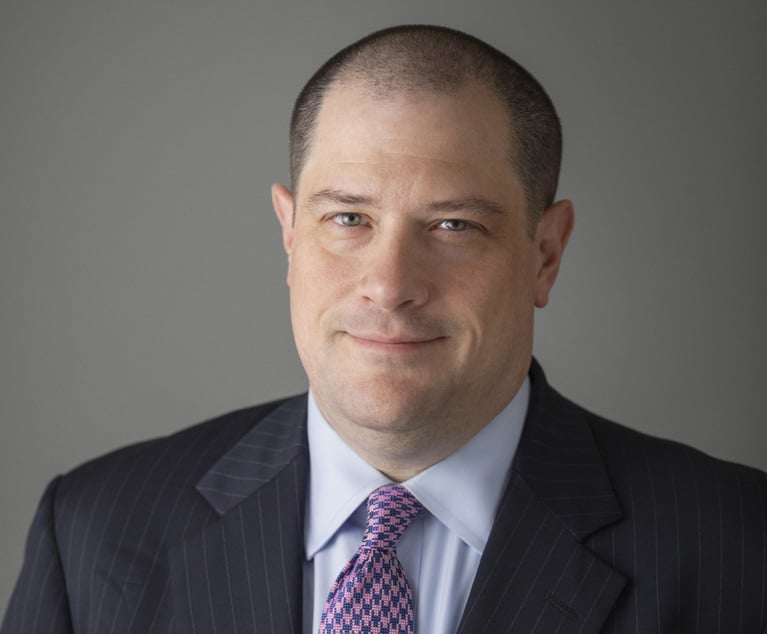 Justices of the U.S. Supreme Court pose during their formal group photograph in the East Conference Room of the Supreme Court in Washington, D.C., on Nov, 30, 2018. Photo: Andrew Harrer/Bloomberg
Justices of the U.S. Supreme Court pose during their formal group photograph in the East Conference Room of the Supreme Court in Washington, D.C., on Nov, 30, 2018. Photo: Andrew Harrer/BloombergThe Constitution Is a 'Promesa' to Keep
The Supreme Court has held repeatedly that private parties have an implied right of action to assert claims for separation-of-powers violations. But this right means nothing unless those bringing successful challenges have access to meaningful remedies.
October 17, 2019 at 05:44 PM
6 minute read
The U.S. Supreme Court heard oral arguments Tuesday in cases that might not get as much attention as the culture-war smorgasbord on the docket this term, but that implicate billions of dollars and, even more important, the vitality of our system of government. That's what's ultimately at stake in the five cases consolidated under the technocratic name Financial Oversight and Management Board for Puerto Rico v. Aurelius Investment.
The cases arose from the restructuring of Puerto Rico's public debt under the Puerto Rico Oversight, Management, and Economic Stability Act of 2016 ("PROMESA," the Spanish word for "promise"), which created a seven-member Financial Oversight and Management Board. PROMESA's practical effect was to require the president to select the board's members from nonpublic lists submitted to the president by House and Senate leaders, without subjecting those appointments to Senate confirmation. The president ultimately agreed to Congress' directive and chose six board members from that secret list, plus one member himself. None of these appointees were ever subject to Senate confirmation.
The cases raise fundamental questions about government structure because the appointments clause of the U.S. Constitution (Article II: Section 2) requires all "officers of the United States" to be nominated by the president and confirmed by the Senate. After the board began restructuring Puerto Rico's debt, certain investor-creditors, as well as the labor union that represents employees of the island's electric utility, challenged the board appointment. As the name creditor, Aurelius Investment, would write in its response to the cert petition in the lead case, "The dubious constitutionality of this scheme was obvious from the beginning."
The U.S. Court of Appeals for the First Circuit, in February, ruled for the challengers but declined to invalidate any of the board's actions, invoking the de facto officer doctrine. In so doing, the court: (1) effectively denied the challengers any meaningful remedy; (2) improperly expanded the power of Congress at the expense of the president and (3) disincentivized private parties from seeking recourse for violations of the Constitution's structural protections.
The First Circuit's erroneous application of the de facto officer doctrine is wholly out of line with Supreme Court precedent and undermines the separation of powers. As the court explained way back in the 1886 case of Norton v. Shelby County, the doctrine is an ancient tool of equity that ratifies acts performed by a government officer acting under color of official title even though it is later discovered that the officer's appointment is legally deficient. The doctrine cures minor statutory defects, not those that violate the Constitution's structural provisions.
Given that the board members' power is "pursuant to" federal law (all the power comes from PROMESA), they occupy "continuing positions" (appointments of three years or longer), and they exercise "significant authority" (power to prosecute and veto, rescind and revise Puerto Rico laws and fiscal plans), the First Circuit correctly concluded that board members were principal federal officers subject to the appointments clause.
At this point, the court should have stricken the unconstitutional grant of appointment authority, vacated the board's decisions, and corrected the constitutional defect by requiring new proceedings before a properly appointed board. Instead, the court fashioned its own judicial remedy under the archaic de facto officer doctrine. Ironically, in attempting to vindicate Congress' improper grant of appointment power to itself, the court made a policy judgment about how best to restructure Puerto Rico's debt, ignoring the constitutional violation and claiming for itself Congress' power to legislate.
The Supreme Court has held repeatedly that private parties have an implied right of action to assert claims for separation-of-powers violations. But this right means nothing unless those bringing successful challenges have access to meaningful remedies. As the court put it in the 1995 case Ryder v. United States, "one who makes a timely challenge to the constitutional validity of the appointment of an officer who adjudicates his case is entitled to a decision on the merits of the question and whatever relief may be appropriate if a violation indeed occurred." In applying the de facto officer doctrine to ratify the unconstitutional board's actions, the First Circuit denied the challengers the relief to which they're entitled.
Constitutional structure is important; it's what ultimately secures our liberties and ensures that we have the rule of law, rather than man—whether that be the president or the group of men and women in Congress, or both in collusion against our founding document. As the justices struggle with the important legal and practical considerations at issue in Puerto Rico's near-bankruptcy—they seemed mostly concerned at argument about whether the board exercised national or local power, which would be a curious way to interpret a federal law created by an act of Congress—they need to show that the judiciary will maintain our ever-fragile separation of powers even when the other branches fail to do so.
Ilya Shapiro is the director of the Robert A. Levy Center for Constitutional Studies at the Cato Institute and publisher of the Cato Supreme Court Review. Cato filed an amicus brief supporting the investor-creditors in the Puerto Rico financial-restructuring cases.
This content has been archived. It is available through our partners, LexisNexis® and Bloomberg Law.
To view this content, please continue to their sites.
Not a Lexis Subscriber?
Subscribe Now
Not a Bloomberg Law Subscriber?
Subscribe Now
NOT FOR REPRINT
© 2024 ALM Global, LLC, All Rights Reserved. Request academic re-use from www.copyright.com. All other uses, submit a request to [email protected]. For more information visit Asset & Logo Licensing.
You Might Like
View All

Protecting Attorney-Client Privilege in the Modern Age of Communications
6 minute read

Lingering Questions at Supreme Court About Climate Change Litigation Need Resolution
6 minute readTrending Stories
- 1Decision of the Day: Sri Lanka Granted Stay of Litigation Over Defaulted Sovereign Bond Debt
- 2AI Adoption, Data Center Building Boom Opening More Doors for Cybercriminals, Many of Them Teenagers
- 3Mayor's Advisory Committee To Hold Hearing on Fitness of Judicial Candidates
- 4Are New York City Housing Providers Ready for the Fair Chance for Housing Act?
- 5Litigator of the (Past) Week Runners-Up and Shout-Outs
Who Got The Work
Michael G. Bongiorno, Andrew Scott Dulberg and Elizabeth E. Driscoll from Wilmer Cutler Pickering Hale and Dorr have stepped in to represent Symbotic Inc., an A.I.-enabled technology platform that focuses on increasing supply chain efficiency, and other defendants in a pending shareholder derivative lawsuit. The case, filed Oct. 2 in Massachusetts District Court by the Brown Law Firm on behalf of Stephen Austen, accuses certain officers and directors of misleading investors in regard to Symbotic's potential for margin growth by failing to disclose that the company was not equipped to timely deploy its systems or manage expenses through project delays. The case, assigned to U.S. District Judge Nathaniel M. Gorton, is 1:24-cv-12522, Austen v. Cohen et al.
Who Got The Work
Edmund Polubinski and Marie Killmond of Davis Polk & Wardwell have entered appearances for data platform software development company MongoDB and other defendants in a pending shareholder derivative lawsuit. The action, filed Oct. 7 in New York Southern District Court by the Brown Law Firm, accuses the company's directors and/or officers of falsely expressing confidence in the company’s restructuring of its sales incentive plan and downplaying the severity of decreases in its upfront commitments. The case is 1:24-cv-07594, Roy v. Ittycheria et al.
Who Got The Work
Amy O. Bruchs and Kurt F. Ellison of Michael Best & Friedrich have entered appearances for Epic Systems Corp. in a pending employment discrimination lawsuit. The suit was filed Sept. 7 in Wisconsin Western District Court by Levine Eisberner LLC and Siri & Glimstad on behalf of a project manager who claims that he was wrongfully terminated after applying for a religious exemption to the defendant's COVID-19 vaccine mandate. The case, assigned to U.S. Magistrate Judge Anita Marie Boor, is 3:24-cv-00630, Secker, Nathan v. Epic Systems Corporation.
Who Got The Work
David X. Sullivan, Thomas J. Finn and Gregory A. Hall from McCarter & English have entered appearances for Sunrun Installation Services in a pending civil rights lawsuit. The complaint was filed Sept. 4 in Connecticut District Court by attorney Robert M. Berke on behalf of former employee George Edward Steins, who was arrested and charged with employing an unregistered home improvement salesperson. The complaint alleges that had Sunrun informed the Connecticut Department of Consumer Protection that the plaintiff's employment had ended in 2017 and that he no longer held Sunrun's home improvement contractor license, he would not have been hit with charges, which were dismissed in May 2024. The case, assigned to U.S. District Judge Jeffrey A. Meyer, is 3:24-cv-01423, Steins v. Sunrun, Inc. et al.
Who Got The Work
Greenberg Traurig shareholder Joshua L. Raskin has entered an appearance for boohoo.com UK Ltd. in a pending patent infringement lawsuit. The suit, filed Sept. 3 in Texas Eastern District Court by Rozier Hardt McDonough on behalf of Alto Dynamics, asserts five patents related to an online shopping platform. The case, assigned to U.S. District Judge Rodney Gilstrap, is 2:24-cv-00719, Alto Dynamics, LLC v. boohoo.com UK Limited.
Featured Firms
Law Offices of Gary Martin Hays & Associates, P.C.
(470) 294-1674
Law Offices of Mark E. Salomone
(857) 444-6468
Smith & Hassler
(713) 739-1250









